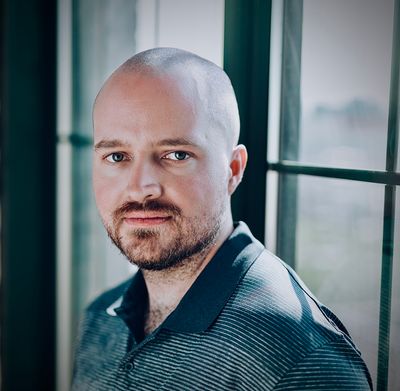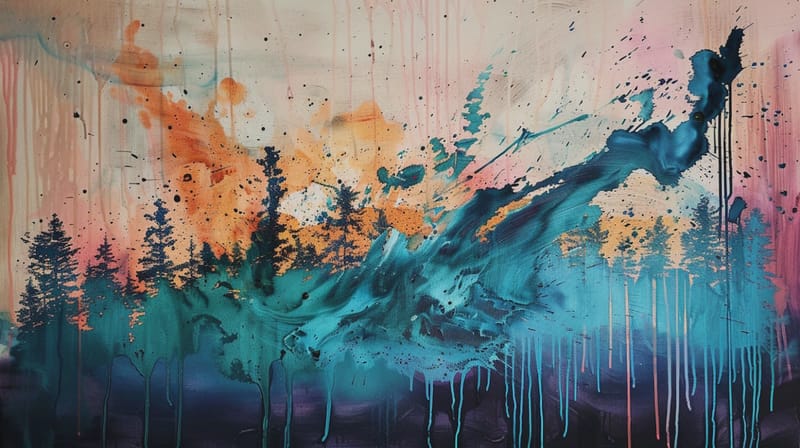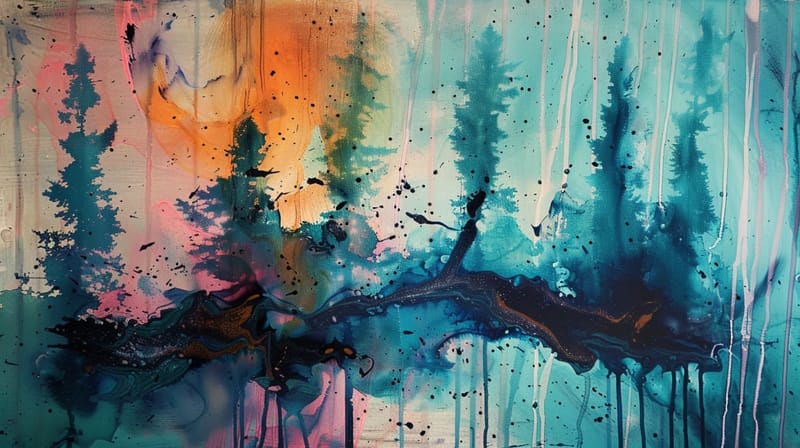I
Navigating the modern internet feels like trudging through a hostile wasteland. The search and social algorithms, ostensibly designed to give us what we want, keep us trapped in the shallows, gorging on an endless supply of junk media that never quite satiates. Danger seems to lurk around every corner—with new grifts, scams, and hucksters sprouting up every minute. All the while, our emotional lives are under constant assault, as the outrage and despair of the culture wars seep into everything.
The modern internet overwhelms us, disheartens us, and distracts us from what matters most. But most alarming of all, it erodes our ability to trust—in others, in ourselves, in institutions, in humanity, and in the future. The scary thing about losing trust is that it becomes a self-fulfilling prophecy. When we suspect the worst, it creates a downward spiral, where we end up co-authoring the future we most fear.
This essay started out as something simple and lighthearted. It was meant to be an invitation to build a more nourishing internet together. And while it still is, I've realized the stakes are so much higher. With our world spiraling into a series of interrelated crises, the internet is our highest point of leverage. Networking together billions of people can be a blessing or a curse. It can compound our problems, making everything much worse, much faster, which appears to be our current path. But the internet can also reverse the tide. It can create the spark that heals individuals and communities, and it can be the conduit that allows those regenerative sparks to ripple through our reality.
It may not feel like it, but each of us gets to choose how we relate to this technology. We get to choose how we'll use it, each and every time we log on. Increasingly, I believe these are choices that matter. Not just for ourselves, but for building a more beautiful future.
II
I've found it helpful to think of the modern internet, and its pervasive hostility, as a Russian nesting doll.
On the outermost layer, you have the observable phenomena. The mountains of clickbait and spam. The raging culture wars. Scams as far as the eye can see. Open up the doll, and on the next layer you'll find a set of "best practices," or culturally agreed-upon rules for how to "win the game." Follow the best practices, and you'll learn to manipulate attention, hijack emotion, game the algorithm, and squeeze money out of everything. One layer beneath the best practices, you'll find a set of assumptions and stories about how the world works. A narrative tapestry of zero-sum thinking and survival of the fittest ideology. And at the core of it all, the innermost layer, is fear. That basest and most primal of emotions.
Each of these layers give us clues for how to better understand the internet, and start nudging it in healthier directions. We can observe the phenomena that rub us the wrong way, and get curious about where they come from. We can discover the best practices driving those phenomena, and experiment with subverting them. We can untangle the stories driving the best practices, and hold them up to sunlight to see through their plot holes. And most importantly, we can examine the emotions underlying our own internet behavior. Because when fear is in the driver's seat, it reinforces every other layer of the nesting doll. Only by pulling a weed at the root do you prevent it from growing right back.
The beautiful thing about the internet is that it's still a wild frontier. The physical frontiers of our world are largely mapped and tamed. But the digital frontier is endless, and it's always open to settlers seeking better ways forward. We are all free to venture forth, follow our curiosity and aliveness, direct our attention in new ways, and find the others. We are free to trust our intuition when it says "things can be so much better than this." And we are free, in every moment, to open up the nesting doll, and be the change we wish to see.
III
My favorite book title, by a long shot, is "The challenges we face as individuals and societies, and becoming who we need to be to face them." The book itself is solid. But the title alone resonates through every fiber of my being.
I think a lot about this puzzle of "becoming who we need to be," and what's required to evolve individually and collectively. The simplest ingredient I've found, and perhaps the most impactful one, is environment. The environments we inhabit matter a great deal. In ways both harmful or healing, our environments can shape our behavior, our beliefs, our emotional life. They can bring out the better angels of our nature, or lead us into the depths of hell. Whether physical or digital, our environments are integral to who we're becoming.
An oasis is a small patch of fertile ground in an otherwise inhospitable environment. It’s a refuge from a dangerous, untrustworthy world. A place where one can let down their defenses, nourish themselves, and rest. It's a place to connect with fellow travelers, and perhaps find a sense of camaraderie and belonging. Oases give us the breathing room to experience the fullness and richness of our humanity. In an oasis, we have the safety, space, and resources to begin blossoming into more fully realized versions of ourselves.
In the natural world, an oasis forms wherever abundant nourishment springs up from the depths of the earth. In the digital world, by contrast, an oasis forms whenever someone allows the abundant gifts of their soul to flow unimpeded by cynicism and fear. In other words, whenever you find an oasis in the wilds of the internet, it's the result of courageous choice. Someone peeled back the layers of the nesting doll, ventured out onto the digital frontier, and started living from their conviction that things can be better.
IV
The internet is already dotted with oases. They exist across niches and subcultures, and across platforms. Some oases are personal and non-commercial, while others are businesses. A digital oasis can look and feel like anything. It can be as simple as a one-page website, or as endlessly complex as a multi-layered, multi-player world. The unifying characteristics of oases—what binds them all together— is that they're authentic expressions of someone's humanity and creativity, and they treat internet visitors as cherished guests, rather than resources to be exploited.
A digital oasis creates the same feeling as its physical counterpart. We're all travelers, wearily making our way through the digital wasteland. When we stumble into an oasis, it feels unexpectedly safe and nourishing. In fact, it feels too good to be true at first. But the longer we stay, the more we realize this isn't a mirage. It's the real thing, and we yearn to spend more time here, because it makes us feel more alive than any other corner of the internet ever has. It makes us feel like maybe, just maybe, the internet isn't so bad after all.
I hope it's clear by now. I believe oases can make our digital lives richer and more nourishing. I believe oases can help us break free of the patterns and incentives making our internet toxic and maladaptive. Lastly, I believe a more delightful internet—where we spend our days in oases that nourish our better angels—can help us become who we need to be, both individually and collectively, to confront the complex problems of modernity.
For those of us who create, we owe it to ourselves, and to the world, to build our own oasis. To rediscover our aliveness, and allow it to flow into the digital world with generosity of spirit. We get to create the corner of the internet we've always wanted, both for ourselves and our homies. We have the power to build digital containers that shape us into the people we yearn to be.
And for those of us who consume, we can reclaim our attention, and our humanity, by directing it towards the oases that make us feel seen, connected, alive. We can starve the algorithmic attention economy beast of its nourishment, and slowly begin to change the culture, and the incentives, on which the modern internet operates. By redirecting our attention, and by supporting those who bravely subvert the status quo, we can effect bottom up change that, given enough time, totally transforms the digital landscape.
This website exists for the celebration and propagation of oases. It's a place where we can share our gratitude for the corners of the internet that nourish us, and a place where we can discover new sources of nourishment. It's a place where we take the evolution of the digital world back into our own hands.
A more beautiful internet is possible, and it all starts with the conscious choice to build oases and inhabit them.
Welcome to Oasis Builders.
As promised, here are the first four oases I added to the site.




And if you'd like to submit an oasis, and write a note of gratitude to your favorite internet dwellers, here's the submission form.



